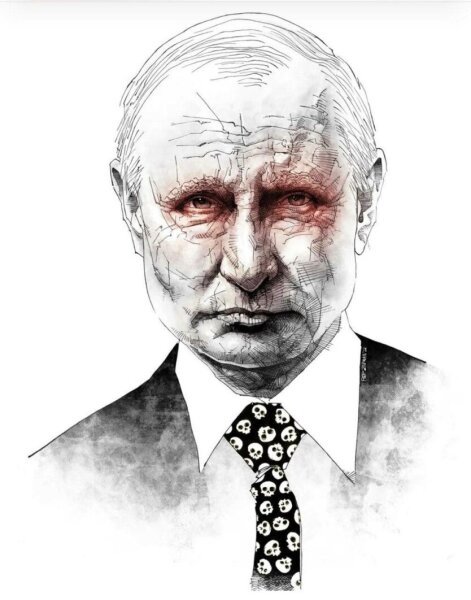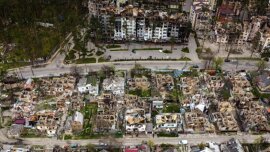It has become fashionable to think that Putin’s planned 2-day blitzkrieg, capture of Kyiv, warm welcomes from Ukrainians of the southeast and the physical destruction of Ukraine’s political leadership were his fundamental goals.
However, let’s take a step back and expand our understanding, looking at Russia’s goals from another point of view. At this point, exclusively in the context of a certain intermediate analysis of events.
I think that Russia clearly understood why it needed this war, had a perfect understanding of all the risks and was totally informed about the possibility of long-term resistance on the part of Ukraine. It is also entirely possible that the Kremlin understood that it would suffer a large volume of military casualties, and that the invaders would be confronted with long-term protests on the occupied territories. We must not think of the enemy as a complete idiot (despite many of its actions being downright idiotic).
We can of course continue to state that Russia planned on forcefully incorporating Ukraine into its zone of direct influence up to and including the Union State, install a puppet government headed by Muraev, Medvedchuk or even Yanukovych (even a child would tell you that they physically won’t last long in Ukraine after everything that has happened). Do you really think that Moscow was expecting an easy Ukrainian capitulation? Absolutely not.
If that’s the case, what’s all this for? What was the real goal of the large-scale war? I think Russia had to fully and completely calculate all of the political, economic, military and diplomatic risks. I have no reason to doubt that this was done.
Rather, the Russian leadership presented itself to the world, Ukraine and its own population in such a way so as to divert attention away from its real goals and towards goals that were not in fact set.
Putin is a KGB alumnus, and is therefore a master of hidden goal-setting. First, he had everyone playing along with the game of “negotiations about security guarantees for Russia,” which had the result of increased domestic fear of NATO and of Ukraine as a Western military buffer.
At this stage the task was simple - to spend three months beating into the minds of everyday Russians the idea that “Ukraine is an anti-Russia, i.e. a Western military proxy directed against Russia.” The talking point of ephemeral biolaboratories only solidified this notion. Basically, “Ukraine is a threat” was taken as an article of faith by the population. 70% approval for Russia’s actions isn’t some kind of deep societal diagnosis. It is the logical result of the effective work of Russia’s informational-psychological machine, as directed at its own population.
Then, Russia achieved clarity on the crucial question of Western participation in the war with Ukraine. NATO, the US and the EU made clear that they will not put boots on the ground. At this point Putin understood that he could afford to risk it.
Then the events of February 20-22 were carried out in such a way so as to get everyone thinking about a potential escalation on the Donbas, particularly after Russia’s extension of recognition to the DPR and LPR proxy-republics. A good feint - everyone indeed came to that conclusion. This was, of course, followed by the momentous attack at 4am on February 24.
By the way, it is instructive to remind everyone how Lavrov and Peskov repeatedly, publicly stated from December to February, that Russia will not attack Ukraine. To be fair they probably still don’t think that they attacked us, calling this all-out war a “special operation.”
It’s important to understand why this term was chosen. In an informational and opportunistic sense, it’s obvious. The biggest “weak point” of the Ukrainian-Russian war is figuring out how to explain its absolute necessity to Russians based on Russian state interests.
If you call the war a war, you risk an all-out delegitimization of your actions. A “special operation” simplifies the character of possible interpretations, explaining the actions of the Russian military through the made-up necessity of ensuring security, and falsely emphasizing the defensive nature of the operation.
The concept of a “special operation” is a temporary measure meant to serve the intermediate amortization of the mass consciousness, a lubricant that helps one process and accept the events as a fact of life. It helps Russians get used to instability, self-sacrifice (since the sacrifices serve a noble goal, according to the military) and post-sanction destitution.
If it comes to it, this approach allows them to later call this a real war. Similarly to how they eventually acknowledged the presence of their military in Crimea. First, Putin denied that the “little green men” were Russian troops, but eventually admitted their presence and in fact turned it into a politically salient talking point.
This is the root cause of the mass support (or at least neutrality) with respect to the war among the Russian public - all of whom have access to information about the war from Ukrainian Telegram-channels or from their Ukrainian relatives, but who choose to ignore, troll, doubt and dismiss it. They refuse to believe, or even to show empathy. This is mass psychosis.
But we’ve been knocked off course a bit. What are Putin’s real goals?
First, it is entirely possible that Russia wasn’t seriously preparing an alternative political infrastructure that would be able to rapidly replace the legal structures of state power on the occupied territories. What we’re seeing in Melitopol, Kherson and Berdyansk shows this clearly. Saldo, Danylchenko - this isn’t on the Kremlin’s level. This is a cheap, temporary substitute.
As they consolidate their control, there will likely be attempts to create more stable collaborationist structures, but the successful experience of the DPR/LPR likely won’t be repeated. There is no critical mass of loyal citizenry. There is an overwhelming desire on the part of the locals to resist occupation, and let’s not forget about the Ukrainian Armed Forces’ counterattacks. For all these reasons, creating “peoples’ republics” in Kherson, Kharkiv and Zaporizhia was likely not a real goal.
Second, Russia clearly prepared for the constant and directed mass-bombing of the civilian population. The rocket forces and “GRADs” were deployed very quickly, and attacks on schools, residential areas, maternity hospitals and kindergartens appear to be well-planned on the part of the Russians.
What is the point of brutally bombing the civilian population, if you intend to make it loyal to you after the occupation of part of the country? Why use phosphorous bombs on Ukraine-controled Luhansk Oblast, if these events can only be interpreted by the local population in a way that breeds hostility to Russia?
Third, and this is the big one. Russia might have taken as its goal not the inclusion of Ukraine in its sphere of influence and its integration into the Union State (it’s clear that this is an unrealistic prospect), but rather to simply cause massive damage, to destroy infrastructure, to turn Ukraine into a scorched land - backwards and incapable of defense and counterattacks on the lands Russia previously captured - Crimea and Donbas. Now they have yet another artificial buffer - the Azov shore.
Turning Ukraine into a second Syria, throwing us back a few decades, destroying our economic and trade potential, blocking the Azov and Black Seas, precipitate a series of worldwide sectoral crises, sharpen the food supply issue, threaten Europe with a massive wave of migration (in hindsight it is clear why they engineered the migrant crisis on the EU’s border with Belarus). These are Russia’s primary goals.
Aside from imperialist tendencies and desires, and also personal psychological quirks, Putin most likely had an overwhelming desire to put an end to the effective reforms in Ukraine, the launch of a series of successful national development programs, and of course its European and Euro-Atlantic aspirations.
In the context of its own system of coordinates the Russian leader can’t allow a former second-tier backwater to get a chance at civilizational transformation and at a comfortable life for its 40 million-strong population. The fact that a significant chunk of this population speaks Russian only amplifies the sociopolitical threat posed to Russia. It is this problematic comparison (successful russophone Ukraine versus backwards russophone Russia) that demanded resolution, which created the motivation for the current situation.
After Medvedchuk’s media was neutered, and the political and electoral power of Kremlin-controlled pro-Russian parties began to rapidly erode (a power that was all to present during the tenure of the last Ukrainian President), Putin understood that political methods would be unable to bend Ukraine into a submissive state of permanent crises (which he was able to do, by the way, in Georgia). That is why he made the decision to achieve his goals with military brutality.
Of course, there is a purely military-strategic calculation here. This brings us to our fourth point. The beloved strategy of the dictator in the Kremlin is to undertake several synchronous actions in order to consolidate successes on at least one of the fronts - the most important one. That is what he did in 2014. The annexation of Crimea created a crisis, but a mere month later Putin played the “Donbas card,” which distracted Ukraine, the US and the EU from the Crimean question. It just “disappeared” in the context of the local war between Russia and Ukraine in the East.
In this war, Putin is acting according to the same logic - it’s just that the stakes are raised to the ceiling. An attack on Kyiv through the Chornobyl zone (which turned out to be a massive weak spot), attempts to capture Chernihiv, Sumy, Kharkiv, rockets hitting every major city, rumors about the participation of the Belarussian army were all designed to disorient the Ukrainian Armed Forces, spread out their efforts, and to give a carte blanche to throw their best forces on Kherson, Zaporizhia, Mariupol and, after our powers have been drained, on Donbas.
The land corridor between Donbas and Crimea, which military analysts continuously emphasized all these years, is Putin’s basic strategic goal, which he is ensuring by fighting in the rest of Ukraine.
This all becomes important and tangible if we look at the situation from the point of view of the enemy’s logic. I repeat - you cannot allow yourself to lose rationality during war. Even if it appears at first glance that Russia has no rationality in its actions. We are not dealing with an irrational war launched by a geriatric fanatic, despite the widespread understanding.
Russia’s biggest, overwhelming problem is that, in turn, they completely disregarded the potential of the military, civil and political/diplomatic resistance on the part of Ukraine, the possibility of careful counterattacks (in complete accordance with the strategy of maneuver, asynchronous warfare). This has allowed Ukraine to preserve the massive capabilities of its military, which is now slowly but surely restoring Ukrainian sovereignty over captured territories, to restructure its economy to suit the current realities, to get resupplied with Western weapons, to carry out the mobilization and training of the prepared and fanatically defensive citizenry, to begin a massive partisan warfare effort in occupied cities, and to limit the room for maneuver of potentially treasonous individuals and party organizations.
Throughout all of this, we must not forget Ukraine’s feverish international efforts - forcing the EU membership question, forming a stable alliance with Ukraine’s friends, and negotiating on security guarantees given to us by the powerful states.
The most important point, I’ve saved for last. Russia, in positioning itself as a powerful and influential state, has through its attack on Ukraine lifted it to the same level of greatness. Its tangible losses in equipment and manpower, and its failure to thus far achieve even its implicit goals, is cultivating Ukraine as a powerful, independent state. One that has already avoided the fate of Czechoslovakia in 1938, which was destroyed by Hitler with the quiet acquiescence of Britain and France.
Our “Winter War” is turning into a “Ukrainian Spring.”

























